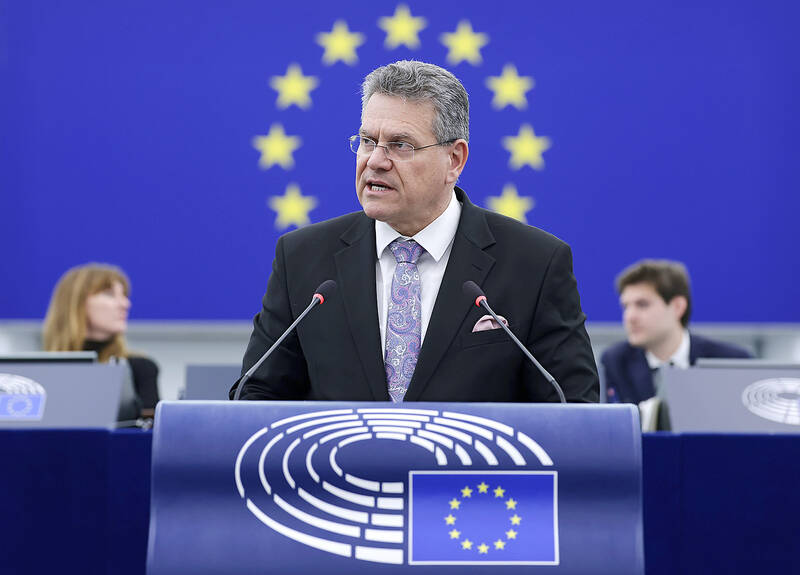The EU has resumed its case against China at the WTO over allegations of economic coercion targeting Lithuania, an EU official said.
Bloomberg reported on Wednesday that the EU was expected to resume the case this week following a one-year suspension. It might re-suspend the proceedings again as early as next week to gather more evidence.
The EU filed a complaint against China at the WTO in 2022 as a result of trade restrictions Beijing imposed on Lithuania after the Baltic country opened a Taiwanese representative office in its capital.

Photo: EPA-EFE
China has repeatedly voiced opposition to countries engaging in official contact with the government in Taipei.
The commission, the EU’s executive arm, at the time, said that China was using economic coercion against one of its member states — a claim that the US and 17 other countries supported as third parties in the case.
In January last year, the EU decided to suspend the proceedings, setting off a year-long lobbying frenzy, with other capitals pushing Brussels not to give up for fear that it would set a bad precedent. The deadline to resume the case expires this week.
Officials from then-US president Joe Biden’s administration had urged the EU to keep pursuing the case.
Not doing so would also have risked antagonizing US President Donald Trump’s administration and some EU members.
The EU is trying to strike a balance between its initial exchanges with Trump and his advisers, who have been vocal about the bloc taking a stronger stance toward China.
The logic back then was that the EU would have likely lost the case because the required evidence was no longer there and could make the EU look weak, people familiar with the matter said.
Suspending the case was tactical, one of the people said, who like the others was granted anonymity to discuss sensitive issues.
The EU has numerous other cases at the WTO involving China, including over patent royalties.
It has also probed the second-largest economy in several areas including public tenders, the procurement of medical devices and electric vehicles, where the bloc applied tariffs last year despite immense pressure from Beijing.

MULTIFACETED: A task force has analyzed possible scenarios and created responses to assist domestic industries in dealing with US tariffs, the economics minister said The Executive Yuan is tomorrow to announce countermeasures to US President Donald Trump’s planned reciprocal tariffs, although the details of the plan would not be made public until Monday next week, Minister of Economic Affairs J.W. Kuo (郭智輝) said yesterday. The Cabinet established an economic and trade task force in November last year to deal with US trade and tariff related issues, Kuo told reporters outside the legislature in Taipei. The task force has been analyzing and evaluating all kinds of scenarios to identify suitable responses and determine how best to assist domestic industries in managing the effects of Trump’s tariffs, he

TIGHT-LIPPED: UMC said it had no merger plans at the moment, after Nikkei Asia reported that the firm and GlobalFoundries were considering restarting merger talks United Microelectronics Corp (UMC, 聯電), the world’s No. 4 contract chipmaker, yesterday launched a new US$5 billion 12-inch chip factory in Singapore as part of its latest effort to diversify its manufacturing footprint amid growing geopolitical risks. The new factory, adjacent to UMC’s existing Singapore fab in the Pasir Res Wafer Fab Park, is scheduled to enter volume production next year, utilizing mature 22-nanometer and 28-nanometer process technologies, UMC said in a statement. The company plans to invest US$5 billion during the first phase of the new fab, which would have an installed capacity of 30,000 12-inch wafers per month, it said. The

Taiwan’s official purchasing managers’ index (PMI) last month rose 0.2 percentage points to 54.2, in a second consecutive month of expansion, thanks to front-loading demand intended to avoid potential US tariff hikes, the Chung-Hua Institution for Economic Research (CIER, 中華經濟研究院) said yesterday. While short-term demand appeared robust, uncertainties rose due to US President Donald Trump’s unpredictable trade policy, CIER president Lien Hsien-ming (連賢明) told a news conference in Taipei. Taiwan’s economy this year would be characterized by high-level fluctuations and the volatility would be wilder than most expect, Lien said Demand for electronics, particularly semiconductors, continues to benefit from US technology giants’ effort

‘SWASTICAR’: Tesla CEO Elon Musk’s close association with Donald Trump has prompted opponents to brand him a ‘Nazi’ and resulted in a dramatic drop in sales Demonstrators descended on Tesla Inc dealerships across the US, and in Europe and Canada on Saturday to protest company chief Elon Musk, who has amassed extraordinary power as a top adviser to US President Donald Trump. Waving signs with messages such as “Musk is stealing our money” and “Reclaim our country,” the protests largely took place peacefully following fiery episodes of vandalism on Tesla vehicles, dealerships and other facilities in recent weeks that US officials have denounced as terrorism. Hundreds rallied on Saturday outside the Tesla dealership in Manhattan. Some blasted Musk, the world’s richest man, while others demanded the shuttering of his